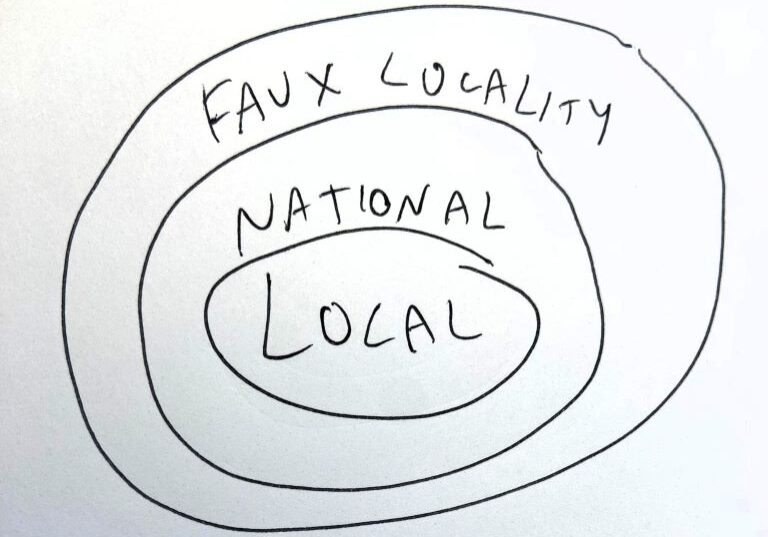If you’re like me, you’ve been put off from digging deeper into DeFi by the terrible signal-to-noise ratio of anything crypto-related on the interwebs. That’s why I found this DeFi primer (using Maker DAO as a specific example) by ET contributor and banking analyst Marc Rubinstein to be so fantastic.

Recent major media stories that feel to us like they’re part of a larger narrative campaign.
Recent major media stories that feel to us like they’re part of a larger narrative campaign.
Recent major media stories that feel to us like they’re part of a larger narrative campaign.

Modeling Common Knowledge by analyzing Missionary statements and their reverberations works. Except when it doesn’t.
What do you get when you give a Raccoon billions of dollars AND invisibility from regulators? Collusion and insider trading.
Most of us are under the impression that a protracted conflict within China will increase national unity. Not this time.
Recent Notes
Is Volatility Back?
On this special episode of the Epsilon Theory podcast, we share an excerpt from a conference call we recorded on February 13 discussing our thoughts on the market selloff earlier in the month. You’ll hear from Christopher Guptill, co-CEO and chief investment officer at Broadmark Asset Management and Dr. Ben Hunt, author of Epsilon Theory.
The Fundamentals Are Sound
Most investors think that other investors think that last week’s correction was about vol-selling. The real story? Everybody knows that everybody knows that inflation will change the way portfolios are built and managed.
Too Clever By Half
The inevitable result of financial innovation gone awry, which it ALWAYS does, is that it ALWAYS ends up empowering the State. When too clever by half people misplay the meta-game, that’s all the excuse the State needs to come swooping in and crush them, just as they are with Bitcoin today they did with Bear and Lehman in 2008. Installment #10 from Notes from the Field.
Things That Go Bump In The Night
Everyone reading this note has, at one time or another, gotten scared about markets and decided to hedge their professional portfolio or personal account. The Game of Markets is changing. But should we be scared?
Year In Review
We’ve had a heckuva busy year at Epsilon Theory, so to ring out 2017 I thought it might be helpful to distribute a master list of our publications over the past 12 months. We’re long essay writers trying to make our way in a TLDR world, so even the most avid follower may well need a map!
The Three-Body Portfolio
In a two-body market, the interactions of fundamental data and prices are generally predictable. In a three-body market, the epsilon — investor behaviors in response to narratives — exerts a powerful gravitational force which must be considered when building a portfolio.
The Three-Body Problem
What if I told you that the dominant strategies for human investing are, without exception, algorithms and derivatives? I don’t mean computer-driven investing, I mean good old-fashioned human investing … stock-picking and the like. And what if I told you that these algorithms and derivatives might all be broken today? You might want to sit down for Part 9 of the Notes from the Field series.
Wall Street’s Merry Pranks: Things that Matter #4
The libertarian paternalism of a Nudge culture in finance has created an industry of investors who care about fees but have forgotten about taxes, trading costs, slippage and behavioral costs of actively trading passive instruments.
Pecking Order
The pecking order is a social system designed to preserve economic inequality: inequality of food for chickens, inequality of wealth for humans. We are trained and told by Team Elite that the pecking order is not a real and brutal thing in the human species, but this is a lie. It is an intentional lie, formed by two powerful Narratives: trickle-down monetary policy and massive student debt financing. Part 8 of the Notes from the Field series.
The Two Churchills
If you can manage to find a truly independent voice in your personal, political and financial life, pursue it with reckless abandon. Don’t set it to the side so that you can build a brand or make an impact. Get your ass out of the boat, grab your bow, strap on your broadsword and sound the pipes. All that’s left is to decide what song you’re going to play.
Make America Good Again
On episode 26 of the Epsilon Theory podcast, we welcome back Rusty Guinn, our executive vice president of asset management, to talk about political markets — a topic just as important to Ben as capital markets. Be sure to also check out the companion pieces to this podcast: “Always Go To the Funeral,” “Sheep Logic,” and “Before and After the Storm.”
Harvey Weinstein and the Common Knowledge Game
It was no great secret that Weinstein was and is a serial rapist. Apparently everyone in Hollywood was familiar with the stories. It was ubiquitous private knowledge, and pretty darn ubiquitous public knowledge. I mean, if you’re making jokes about it on 30 Rock, it’s not exactly a state secret.
But there was never a Missionary.
The Myth of Market In-Itself: Things That Matter #3, Pt. 2
The behaviors that influence markets must be considered in context of archetypes, the languages and identities which group investors every bit as much as identity politics groups voters.
Clever Hans
Part 7 of Ben’s Notes from the Field series reminds us that you don’t break a wild horse by crushing its spirit. You nudge it into willingly surrendering its autonomy. Because once you’re trained to welcome the saddle, you’re going to take the bit. We are Clever Hans, dutifully hanging on every word or signal from the Nudging Fed and the Nudging Street as we stomp out our investment behavior.
Gandalf, GZA and Granovetter
When we try to define others’ Cartoon, we take away their agency, and strip away their humanity. And we do it with our clients, every time we guess what behavioral box they fit it.
Failure to Inflate
On episode 25 of the Epsilon Theory podcast, we’re joined by Peter Cecchini, Chief Market Strategist, Head of Equity Derivatives and Cross-Asset Strategy at Cantor Fitzgerald, to discuss one of his recent notes, “Failure to Inflate.” As Peter writes, “The theories that guide monetary policy fail to explain why growth and inflation remain so low in developed economies.” Tune in to hear why this is and what might bring about higher inflation.
Massively Fast Compute, AI Algorithms and Blockchain Development (by Silly Rabbit)
I’m limiting this week’s Rabbit Hole to three links which represent the rapid tick-tock of the trifecta of massively fast compute, AI algorithms and blockchain development as I believe that these are the top three technology mega-trends of the 2015 – 2025 period (ex-Life Sciences innovation).
Sheep Logic
In Part 6 of the Notes from the Field Series, Ben observes that we think we are wolves, living by the logic of the pack. In truth we are sheep, living by the logic of the flock.
Information Bottlenecks, Fake News and Boredom (by Silly Rabbit)
A new idea called the “information bottleneck” is helping to explain the puzzling success of today’s artificial-intelligence algorithms — and might also explain how human brains learn.
The Myth of Market In-Itself: Things That Matter #3, Pt. 1
Benjamin Graham famously said that the market is a voting machine in the short run, and a weighing machine in the long run. This is a right-sounding idea. It is also wrong. Behavior matters over every horizon.










































